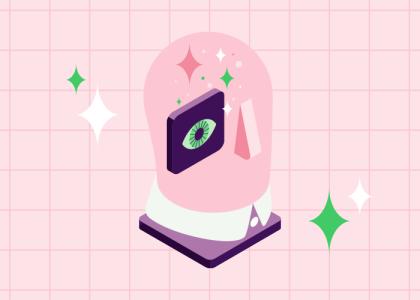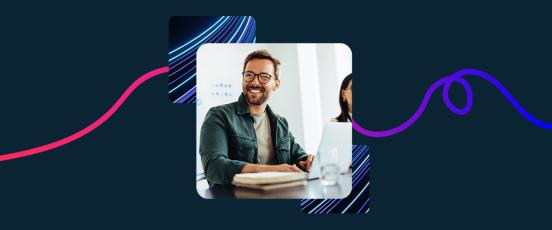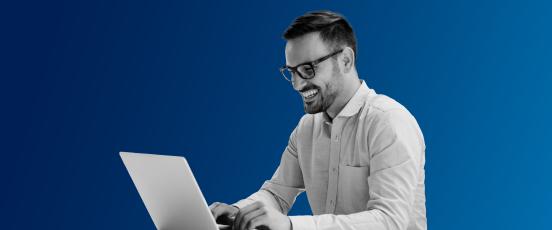AI in HR: Shaping workplace innovation and change

From smarter recruitment to better employee engagement, explore how HR AI tools can enhance employee experience and empower HR leaders.
Rethinking AI for HR: a partner, not a replacement
For many senior business leaders, the rise of AI is both exciting and unsettling. How will AI Impact jobs? Will it replace them? Or can it actually enhance the human side of work?
Pressing questions – especially for HR. Sensitive data, employee trust, and company culture all sit at the heart of your work. Understandably, the idea of AI taking over jobs can feel threatening.
But the truth is more balanced: AI replaces tasks, not people. And when implemented thoughtfully, it gives HR teams back what they need most: time for people.
Jobs vs. tasks: why the distinction matters
Think of it like this, AI can scan resumes, schedule interviews, and flag anomalies in payroll. But can it build trust with a candidate, coach an employee, or sense unspoken tension in a team meeting?
A job is made up of a collection of tasks wrapped in creativity, judgment, and empathy. AI takes on the repetitive parts, leaving the meaningful human work where it belongs – with people.
The reality: AI for HR professionals and the future of work
It’s tempting to focus on fear. According to a McKinsey report, automation could affect nearly 30% of US work hours by 2030. But that doesn’t mean widespread unemployment. Instead, as manual tasks shift to AI, roles are evolving and creating space for higher-value work.
In HR, that means reducing time spent on payroll checks, screening resumes, and scheduling. These are some of the areas where HR AI tools can drive efficiency and free up HR teams to improve employee engagement and cultivate culture.
The real benefits of AI in HR
A recent PwC report predicts that more than 70% of US executives believe AI will fundamentally change business within the next few years.
For HR, change is already here. Some notable benefits of AI in HR include:
- Smarter recruitment – From CV screening to candidate matching, AI helps identify top talent faster
- Better employee experience – Predictive insights highlight issues early, before they turn into bigger problems
- Continuous, personalized development – Regular check-ins and tailored learning give employees more ownership over their growth
- Simplified operations and workflows – Routine tasks like approvals, reminders, and data entry run automatically, freeing up HR to focus on strategy and company culture
The People First difference: empathetic innovation
At MHR, our AI vision is simple: Smarter AI for HR, built for people. We call this empathetic innovation.
We believe technology should enhance, not replace people. That’s why our People First platform is designed to:
- Accelerate routine tasks (remove repetitive admin)
- Amplify knowledge and skills (create better coaches)
- Augment complex workflows (support smarter, faster decisions)
The result? More human interaction, not less. AI removes friction and gives HR more time for meaningful conversations, connection, and leadership.
Real-world lessons in AI
Organizations that have already adopted AI in HR show clear benefits: faster processes, stronger engagement, and more accurate decisions. But implementation isn’t only about technology, it’s about trust.
When speaking about introducing AI into their HR processes, Neelam Talewar, Director of the London School of Economics’ People Management Transformation Programme, shares that:
“We’ve done a lot of work in consultation, communication and getting the organisation ready for the change. We’ve already built that credibility and trust to enable people to look forward to what else is coming, because it’s already made a positive impact in their lives.”
The lesson for HR leaders? Start small, prove value, and scale gradually. Demonstrate how AI saves time, uncovers insights, and strengthens the overall experience of employees. By leading with transparency, you can build the trust necessary for your organization to gain the benefits of AI in HR.
A future built on balance
As AI evolves, new possibilities will emerge – from AI-assisted coaching to tools that support employee wellbeing. But no matter how advanced, AI cannot replace the human judgment, empathy, and leadership that define HR. AI is not a competitor, it’s an ally. By handling repetitive tasks, providing data-driven information, and supporting development, it gives HR leaders the freedom to focus on people.
So, the question isn’t whether AI will change HR. It already has. The better question is how HR leaders will guide that change.
Learn more: Sign up for our World of Work 2050 webinar series
Join us for our World of Work 2050 webinar with Futurist Tom Cheesewright to explore how AI is reshaping HR and how you can prepare.


